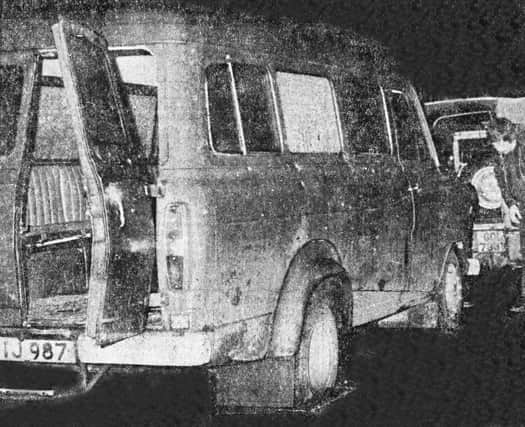Kenny Donaldson: Kingsmills has shown how the Irish government continues to be evasive on legacy


They were murdered for reasons of raw sectarian hatred, just as the O’Dowd and Reavey brothers had been the previous day.
Since that point the Kingsmills families alongside survivor Alan Black have pursued justice and accountability for the heinous events of that fateful night.
Advertisement
Hide AdAdvertisement
Hide AdA new legacy inquest was secured (one of the minority of inquests where the perpetrators were Irish republican terrorists) The inquest has been pursuing evidence from An Garda Siochana (AGS) since 2014. At that stage the then Coroner, John Leckey, said that one of the purposes of the Inquest was to allay rumour and suspicion.
But the converse has happened; The Kingsmills families view the southern authorities’ approach, and the secrecy they stipulated should be attached to AGS evidence as acts of bad faith which has undermined the inquest and fuels public suspicion around what AGS knew of the massacre and those behind it.
Let’s remind ourselves; the Historical Enquiries Team highlighted that many details relating to the Kingsmills attack happened from the territory of the Republic of Ireland. The Provisional IRA getaway van was hijacked and dumped in the Dundalk area, the top three suspects had extensive terror records in the Republic of Ireland jurisdiction, four weapons were recovered in Co Louth – with one man jailed as a result – and four suspects were questioned by the Garda in 1976. The inquest has also heard that a key suspect with the cipher S37 was “a big man in the Provisional IRA in Dundalk”.
Pre-approved questions from the Kingmills families were put to a Garda witness by an Irish High Court judge in March 2022 – but behind closed doors in Dublin. Newly drafted Republic of Ireland legislation for the hearing blocked relatives and the media from attending. This is contrary to the inquest hearings in Northern Ireland where retired RUC GC officers, some of whom were in their 80s, gave evidence in public to the inquest, were questioned by counsel for the families and the media were able to inform the public of their evidence.
Advertisement
Hide AdAdvertisement
Hide AdIn reading the Irish legislation in question it merely states that the Garda evidence must only be used for inquest purposes. It does not forbid the evidence being published.
The fact that the Northern Ireland judicial system is kowtowing to this demand from the Irish authorities is a huge red flag for the future of legacy processes in Northern Ireland, in which input is needed from the southern authorities.
This variance in approach is at the heart of the legacy problem concerning events of a cross-border nature, Dublin continue to be evasive and stonewall instead adopting an approach that they are there to quality proof what the Brits bring forward on legacy. The Irish government selectively supports the campaigns of some north of the border but is unwilling (unless cornered) to engage with others where it has questions to answer.
Kingsmills was the litmus test of how serious the southern authorities are around bringing a measure of accountability for those grievously wronged and who carry the burden of injustice.
Advertisement
Hide AdAdvertisement
Hide AdThe meek and passive submission of the Northern Ireland courts to this outrageous demand from Dublin authorities’ risks setting a totally unacceptable precedent that all future evidence from Dublin on Troubles related murders will be given in secret behind closed doors in Dublin and that any documentation which is collated from such hearings will forever be locked away from public view.
Not only that but it is a grave injustice against grieving victims who want to hear open and transparent evidence from Dublin about the murder of their loved ones.
Compare that with the many ongoing open legacy inquests, public inquiries and Police Ombudsman investigations in Northern Ireland into the actions of UK authorities and its security forces.
We’ve said it before and we’ll say it again; the Irish state were not neutral onlookers for ‘The Troubles,’ they were an active participant and have a case to answer for their acts of commission and omission.
Advertisement
Hide AdAdvertisement
Hide AdThe people of this island north and south need and deserve better in order to give any hope of honesty, reparation and healing and reconciliation going forward - and the clock continues to tick.
• Kenny Donaldson is Director of Services at South East Fermanagh Foundation (SEFF)